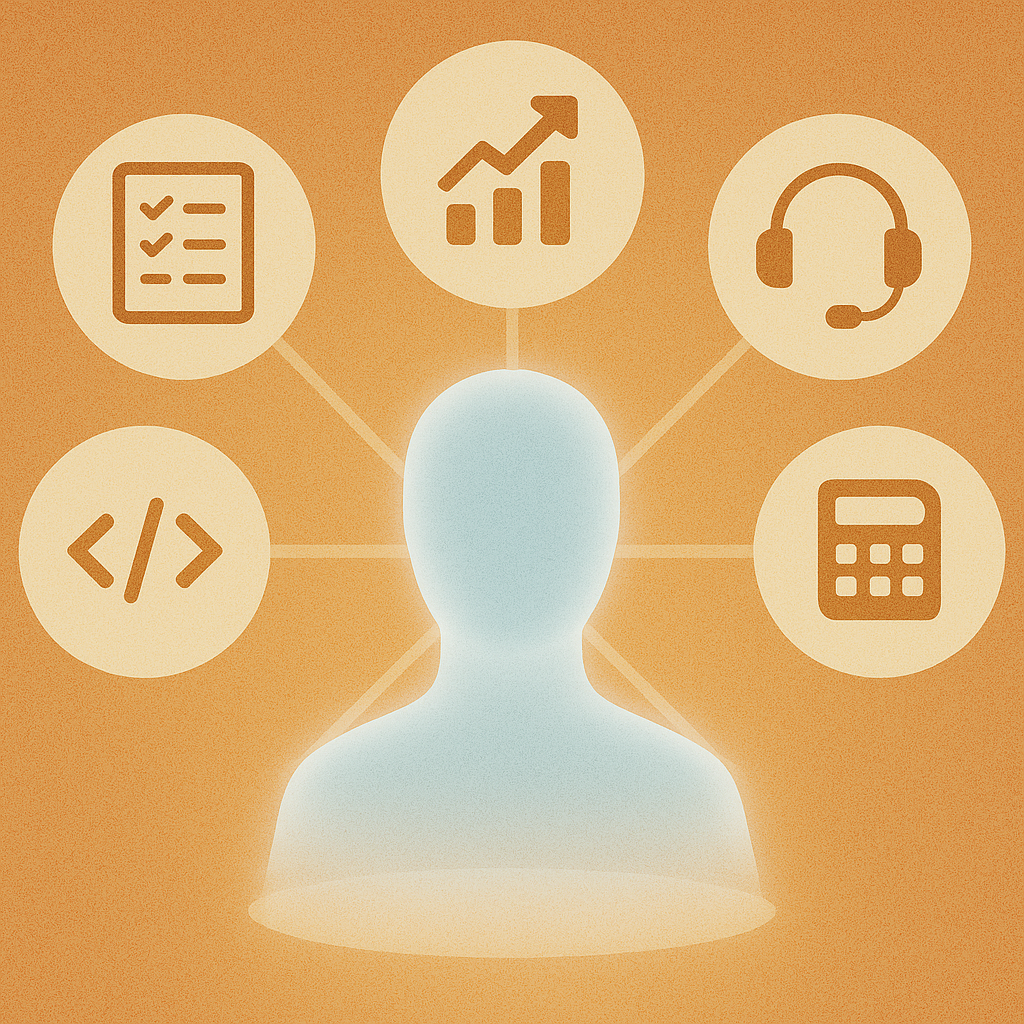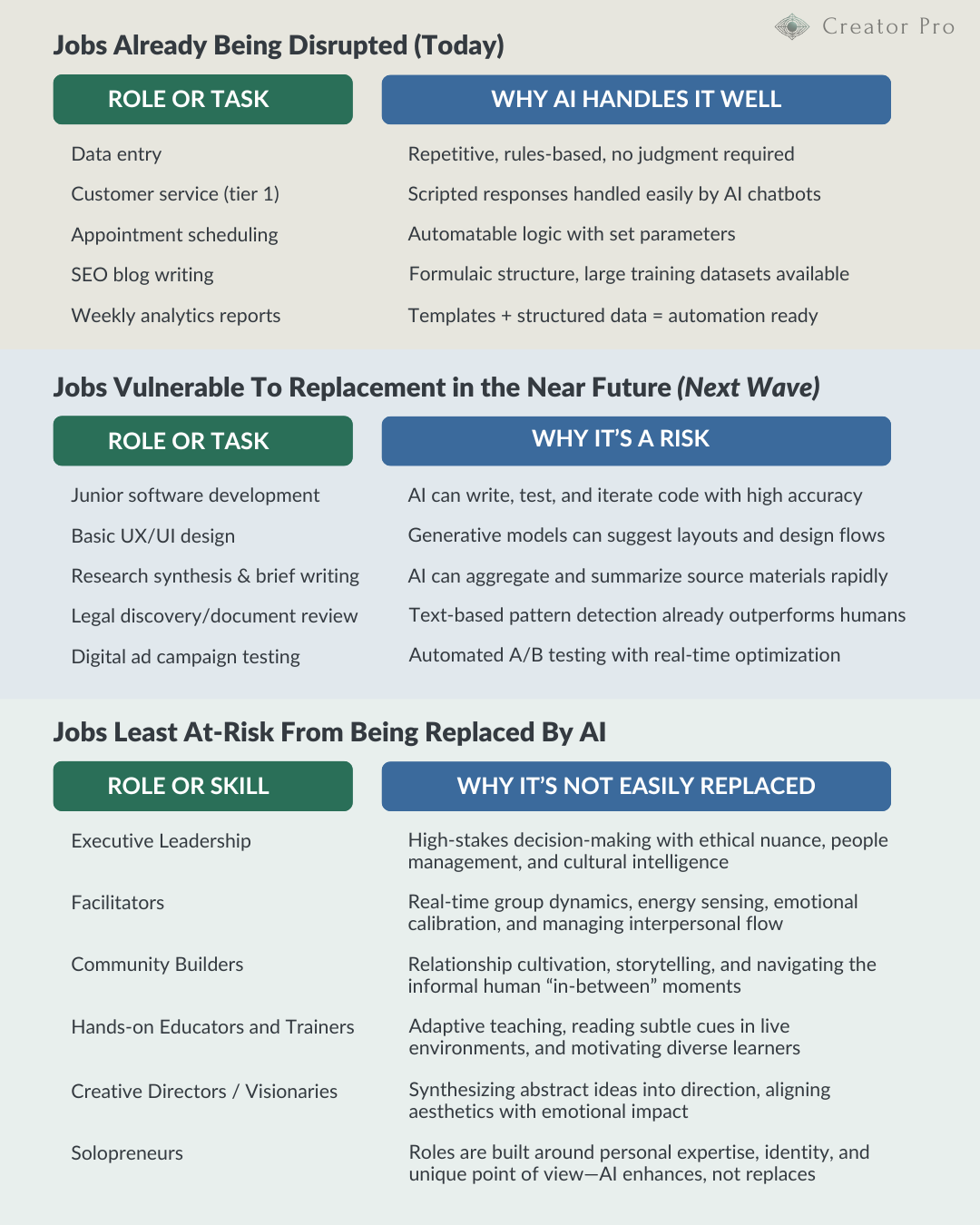Which Jobs Will AI Actually Replace?

Understanding displacement, funding paradoxes, and the future of meaningful work
The AI conversation is stuck in the wrong place.
Most headlines either fuel panic, “AI is coming for your job!”
Or blind optimism, “AI will make everything easier!”.
Neither perspective gives professionals what they actually need: clarity and reassurance.
Yes, some jobs are being replaced. But the real story isn’t about doom—it's about which jobs are being affected, why, and what comes next.
Let’s break it down.
Which Jobs is AI Actually Replacing?
First, an important truth: AI is replacing many jobs that no one wants.
These aren’t the roles that showcase human creativity, leadership, or empathy. They’re the repetitive, rules-based tasks that lead to burnout, boredom, and wasted human potential. In that sense, automation isn’t a threat—it’s a gift. It clears the path for people to step into work that is more strategic, relational, and fulfilling.
But at the same time, it’s worth mentioning that there is a strange paradox unfolding beneath the surface:
The AI Funding Paradox
AI Is Coming for the Very Jobs It’s Funded to Create
Right now, the majority of tech investment is going toward engineering-heavy jobs—machine learning, coding, algorithm development, computational design. Yet these are the exact fields where AI is advancing most rapidly.
In fact, AI models are already outperforming humans at coding, debugging, and writing entire blocks of functional software. Research from OpenAI, Microsoft, and GitHub Copilot shows that AI tools can automate large portions of development tasks—often better, faster, and with fewer errors than their human counterparts.
So while VC money and hiring trends continue to lean heavily on technical roles, the reality is that AI is becoming exponentially better at the very jobs engineers are creating it to do.
It’s a self-replacing cycle, and few are talking about it.
Two Tiers of Disruption
Jobs Being Replaced Today & In The Next Wave
To understand what’s actually changing, it helps to separate current displacement from near-future risks and what jobs aren’t at risk at all:

Where Humans Still Matter Most (And Always Will)
The roles that remain resistant to automation aren’t necessarily “high-tech.” They’re high-context.
Jobs that involve:
- Emotional intelligence
- Creative risk-taking
- Ethical judgment
- Strategic decision-making
- Complex team dynamics
These roles require human discernment—the kind of deep thinking, relational nuance, and improvisation that current models can’t replicate.
So rather than fearing replacement, professionals should be asking:
“How do I use AI to offload the repetitive parts of my job so I can focus on the work only I can do?”
Amplifying Human Flourishing, Not Replacing It
This is where the story gets exciting.
AI doesn’t have to signal the end of human work—it can mark the beginning of more meaningful work.
Imagine if:
- A strategist spends less time formatting reports and more time shaping vision.
- A therapist automates session notes and focuses more on client breakthroughs.
- A marketing director uses AI to draft campaign skeletons and refines only the best ones.
- A coach partners with AI for pattern recognition, freeing up energy to focus on client transformation.
- A solopreneur offloads administrative tasks to AI and finally has space to build their next product.
Embracing AI requires a mindset shift: from resistance to collaboration.
The Bottom Line
AI isn’t coming for your career—it’s coming for your tasks.
If you’re trying to use AI to replace 100% of what you do, then yes—your job is at risk. But if you’re using AI to amplify your thinking, automate the repetitive, and free yourself up for more insightful, human-centered work, you’re not replaceable. You’re indispensable.
The most resilient professionals will be those who use AI as a tool, not a substitute—those who know how to pair human insight with machine intelligence to get better results, faster. That’s a future of work worth building toward.
The question shouldn’t be whether you’re replaceable, but whether you’re ready to evolve.